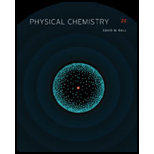
Physical Chemistry
2nd Edition
ISBN: 9781133958437
Author: Ball, David W. (david Warren), BAER, Tomas
Publisher: Wadsworth Cengage Learning,
expand_more
expand_more
format_list_bulleted
Question
Chapter 16, Problem 16.6E
Interpretation Introduction
Interpretation:
The allowed electronic transitions for a
Concept introduction:
The phenomenon of splitting of a spectral line when a magnetic field is applied to it is known as Zeeman Effect. Magnetic field strength can be measured by using the Zeeman Effect. Applications of Zeeman Effect include NMR spectroscopy, MRI and electron spin resonance spectroscopy.
Expert Solution & Answer
Want to see the full answer?
Check out a sample textbook solution
Students have asked these similar questions
You know that the wavenumbers of the rotational transition J = 1← 0 for 1H35Cl and2H35Cl are 20.8784 and 10.7840cm-1, respectively. Accurate atomic masses are1.007825 and 2.0140 for 1H and 2H, respectively. The mass of 35Cl is34.96885. Conclude based on this information that the bond lengths are the sameor different
: A space probe was designed to seek carbon monoxide in Saturn’s atmosphere by looking for
lines in its rotational spectrum. If the bond length of CO is 112.8 pm, at what wavenumbers (in cm-1) do the first three rotational transitions appear? Carbon is almost all carbon-12, so for this
part, you can assume it’s all 12C). What resolution would be required to determine the isotropic
ratio of 13C to 12C on Saturn by observing the first three 13CO rotational lines as well? (In other
words how far apart, in cm-1, are the rotational transitions of 12CO and 13CO
(i) Explain how the mass of the particle(s) involved affects the separation
between energy levels in quantum mechanics.
(ii) Explain why the sensitivity of an NMR experiment is affected by the strength of
the applied magnetic field.
(iii) Explain why, to a good approximation, rotational and vibrational transitions do
not change the energies of electrons.
Chapter 16 Solutions
Physical Chemistry
Ch. 16 - Prob. 16.1ECh. 16 - Prob. 16.2ECh. 16 - Prob. 16.3ECh. 16 - Prob. 16.4ECh. 16 - Prob. 16.5ECh. 16 - Prob. 16.6ECh. 16 - Prob. 16.7ECh. 16 - Prob. 16.8ECh. 16 - Prob. 16.9ECh. 16 - Prob. 16.10E
Ch. 16 - Prob. 16.11ECh. 16 - Prob. 16.12ECh. 16 - Prob. 16.13ECh. 16 - Prob. 16.14ECh. 16 - Prob. 16.15ECh. 16 - Prob. 16.16ECh. 16 - Prob. 16.17ECh. 16 - Prob. 16.18ECh. 16 - Prob. 16.19ECh. 16 - Prob. 16.20ECh. 16 - Prob. 16.21ECh. 16 - Prob. 16.22ECh. 16 - Prob. 16.23ECh. 16 - Prob. 16.24ECh. 16 - Prob. 16.25ECh. 16 - Prob. 16.26ECh. 16 - Prob. 16.27ECh. 16 - Prob. 16.28ECh. 16 - Prob. 16.29ECh. 16 - Prob. 16.30ECh. 16 - Prob. 16.31ECh. 16 - Prob. 16.32ECh. 16 - Prob. 16.33ECh. 16 - Prob. 16.34ECh. 16 - Prob. 16.35ECh. 16 - Prob. 16.36ECh. 16 - Prob. 16.37ECh. 16 - Prob. 16.38ECh. 16 - Prob. 16.39ECh. 16 - Prob. 16.40ECh. 16 - Prob. 16.41ECh. 16 - Prob. 16.42ECh. 16 - Prob. 16.43ECh. 16 - Prob. 16.44ECh. 16 - Prob. 16.45ECh. 16 - a The structure of 2 chloroethanol is usually...Ch. 16 - Prob. 16.47ECh. 16 - Prob. 16.48ECh. 16 - Prob. 16.49ECh. 16 - Prob. 16.50ECh. 16 - Prob. 16.51ECh. 16 - Prob. 16.52ECh. 16 - Prob. 16.53ECh. 16 - Prob. 16.54ECh. 16 - Prob. 16.55ECh. 16 - Prob. 16.56ECh. 16 - A microwave oven emits radiation having a...
Knowledge Booster
Similar questions
- The following are sets of rotational quantum numbers (J,MJ,K). Label each indicated transition as either allowed or forbidden. Hint: Remember the rules for allowed values of the various quatum numbers. a (0,0,0)(1,1,0)b (0,0,0)(1,0,0) c (3,2,1)(3,1,1)d (4,4,1)(2,4,1)arrow_forwardThe following are sets of rotational quantum numbers (J,MJ,K). Label each indicated transition as either allowed or forbidden. Hint: Remember the rules for allowed values of the various quantum numbers. a (5,4,0)(3,6,0)b (8,2,2)(9,2,2) c (7,4,2)(7,4,2)d (4,2,5)(3,2,5)arrow_forward2.2 You know that the wavenumbers of the rotational transition J = 1← 0 for 1H35Cl and 2H35Cl are 20.8784 and 10.7840cm-1, respectively. Accurate atomic masses are 1.007825 and 2.0140 for 1H and 2H, respectively. The mass of 35Cl is 34.96885. Conclude based on this information that the bond lengths are the samearrow_forward
arrow_back_ios
arrow_forward_ios
Recommended textbooks for you
 Physical ChemistryChemistryISBN:9781133958437Author:Ball, David W. (david Warren), BAER, TomasPublisher:Wadsworth Cengage Learning,
Physical ChemistryChemistryISBN:9781133958437Author:Ball, David W. (david Warren), BAER, TomasPublisher:Wadsworth Cengage Learning, Principles of Modern ChemistryChemistryISBN:9781305079113Author:David W. Oxtoby, H. Pat Gillis, Laurie J. ButlerPublisher:Cengage Learning
Principles of Modern ChemistryChemistryISBN:9781305079113Author:David W. Oxtoby, H. Pat Gillis, Laurie J. ButlerPublisher:Cengage Learning Principles of Instrumental AnalysisChemistryISBN:9781305577213Author:Douglas A. Skoog, F. James Holler, Stanley R. CrouchPublisher:Cengage Learning
Principles of Instrumental AnalysisChemistryISBN:9781305577213Author:Douglas A. Skoog, F. James Holler, Stanley R. CrouchPublisher:Cengage Learning Chemistry for Engineering StudentsChemistryISBN:9781337398909Author:Lawrence S. Brown, Tom HolmePublisher:Cengage Learning
Chemistry for Engineering StudentsChemistryISBN:9781337398909Author:Lawrence S. Brown, Tom HolmePublisher:Cengage Learning Chemistry for Engineering StudentsChemistryISBN:9781285199023Author:Lawrence S. Brown, Tom HolmePublisher:Cengage Learning
Chemistry for Engineering StudentsChemistryISBN:9781285199023Author:Lawrence S. Brown, Tom HolmePublisher:Cengage Learning

Physical Chemistry
Chemistry
ISBN:9781133958437
Author:Ball, David W. (david Warren), BAER, Tomas
Publisher:Wadsworth Cengage Learning,


Principles of Modern Chemistry
Chemistry
ISBN:9781305079113
Author:David W. Oxtoby, H. Pat Gillis, Laurie J. Butler
Publisher:Cengage Learning

Principles of Instrumental Analysis
Chemistry
ISBN:9781305577213
Author:Douglas A. Skoog, F. James Holler, Stanley R. Crouch
Publisher:Cengage Learning

Chemistry for Engineering Students
Chemistry
ISBN:9781337398909
Author:Lawrence S. Brown, Tom Holme
Publisher:Cengage Learning

Chemistry for Engineering Students
Chemistry
ISBN:9781285199023
Author:Lawrence S. Brown, Tom Holme
Publisher:Cengage Learning